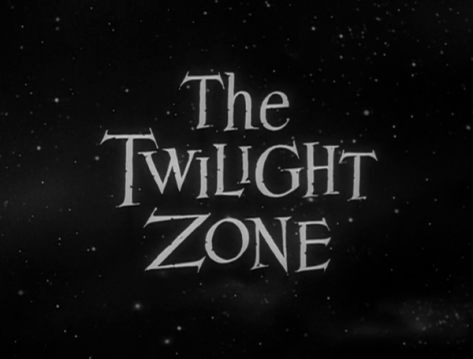
I've been watching a lot of television, lately. It's embarrassing. I should be reading more books or doing more than cursorily scanning the front page of the newspaper. Instead, after work I flip on the set and vegetate for an hour. I hope this doesn't become a habit!
It's certainly not as if TV has gotten significantly better. Mr. Ed, My Sister Eileen, the umpteenth season of the Jack Benny Show, none of these are going to win any awards. On the other hand, The Twilight Zone has already won an award (an Emmy last year), and I'm hoping that my continued watching and review of that show excuses my overindulgence in the others.

What did we see last month? First off, there was Back There. Corrigian, a youngish historian, departs for home from his Gentleman's Club after a rousing discussion on time travel. One step outside the Club, and he finds himself in April 1865 on the eve of Lincoln's shooting. Of course, he tries to avert the tragedy, but only one fellow, a sympathetic policeman believes him. Then Corrigan is waylaid by none other than the assassin, John Wilkes Booth. The President is slain, despite the policeman's herculean efforts to warn him, and the professor returns to a seemingly unchanged present. Or is it? The servant who saw Corrigan out is now a wealthy businessman. It turns out he's the great grandson of the policeman from the past, whose attempts to save Lincoln won him acclaim. The lesson: the river of time doesn't like to make drastic changes of course, but it can meander a little. Not bad. Not great. Three stars.

Second up, we have yet another of the hard-to-watch videotape episodes, The Whole Truth. The gimmick for this one was spoiled in the prior week's preview and in the opening of the episode: a crook of a used car salesman buys a haunted Model A, the purchase of which compels the new owner to always tell the truth. This proves fatal to the fellow's business until he hatches a plan to sell the vehicle to none other than Nikita Khruschev. It's an episode that relies on the charisma (or convincing lack thereof) of the main character. Jack Carson does a pretty good job. Three stars.

I looked forward to Invaders; Richard Matheson did the screenplay, and it was billed as a masterpiece of lines-less drama. Something must have happened between the writer's pen and the screen because watching 22 turgid minutes of a farm woman menaced by a pair of miniature Michelin Men was excruciating. My first instinct is to put a good portion of the blame on the actress, Agnes Morehead. There was enough ham in her silent performance to poison a dozen shuls. On the other hand, it might be the director's fault. I heard through the grapevine that Matheson was not happy with the final product—he'd written in twice the action, and the alien invaders (who turn out to be human astronauts in a world of giants) had their screen time kept to a minimum in his version. That would have been nice; they did not bear being in full view very well. My daughter spent much of the show groaning in agonized boredom, pounding the floor. I'm lucky the cops didn't come to take me away for bad parenting. One star.

Thankfully, the follow-up show was a lot of fun. Dick York plays a harried banker who gains the ability to read minds for a day. He figures out what's going on with refreshing haste and uses the gift to great advantage, preventing a potential robbery, halting a bad loan, and getting the girl (who was too shy to verbalize her interest). The scene where he listens in on the thoughts of a vacant-eyed bank patron who turns out not to be thinking about anything is a nice touch. Four stars.
Not a bad run, and good enough to keep us watching on Fridays. Are you tuning in, too?









































